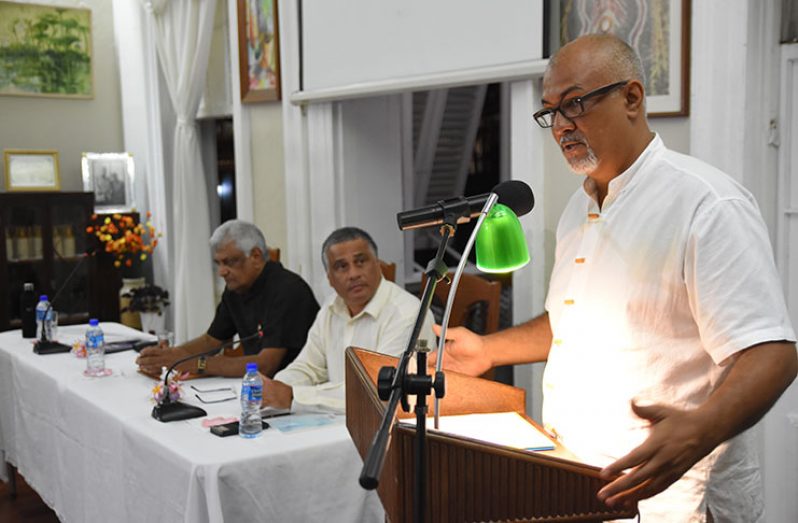…at GPA panel discussion on World Press Freedom Day
AT a panel discussion hosted by the Guyana Press Association (GPA) on the media and disinformation during the elections period, it was highlighted that greater efforts ought to be channelled towards local media monitoring.
The panel discussion took place on Thursday at Moray House and was attended by media operatives from a range of agencies as well as members of the private sector. The event came ahead of World Press Freedom Day celebrated on Friday and zeroed in on the topic ‘Media for Democracy: Journalism and Elections in a time of Disinformation’.
Present on the panel were Human Rights and Conflict Resolution Specialist Lawrence Lachmansingh; former Guyana Elections Commission (GECOM) Chairman, Dr. Steve Surujbally and former Association of Caribbean Media Workers (ACM) President, Wesley Gibbings.
In his introductory remarks to the attendees, Lachmansingh first reminded that the role of the journalist is to convert information into digestible content for the public to understand.
While many journalists understand this, he stated that several negative factors such as the ill-use of social media; sensationalism and political bias continue to pose massive roadblocks to the proper functioning of the press.
He explained that many newspapers struggle with the will to provide the public with the information they need and with the provision of sensationalism which often times keeps the paper afloat through sales.
Meanwhile, he highlighted that the promoting of “hate speech” through the media, as has occurred in Guyana, is perhaps the worst form of bias. “Bias tends to reinforce social division. So it actually doesn’t help us to harmonise, to be cohesive, to be united because it emphasises divisions…in a worse-case scenario, you can actually have violence happening,” he said.
He observed the well-known state of Guyana whereby the country is largely influenced by “two poles of gravity” meaning two largely followed political parties— which tend to influence the media in one direction or the other. However, he stated that over the years the media have begun to develop an eye for existing bias. “Over the last 20 or 30 years there seems to have been a maturing of the media in Guyana in terms of bias. We’re obviously not 100 per cent there and with social media, we have to be extra vigilant but the challenge of bias seems to increasingly recognised and very well dealt with,” he said.
Lachmansingh listed GPA trainings, efforts to verify and balance sources, encouragement of the right of reply, the strengthening of the GPA Code of Conduct and the gradual growth of the Media Monitoring Unit (MMU).
Meanwhile, he listed the Ethnic Relations Commission (ERC); the Broadcasting Act and the Racial Hostility Act as mechanisms that can be strengthened to better address and monitor media reports. “All of these institutions that exist on paper need strengthening,” he stated.
In his remarks, Dr. Surujbally, who holds almost 16 years’ experience in the Elections Commission, lauded the GPA for seeing the need for the important discussion as the nation approaches a significant time in its history. He stressed that media entities, despite the many challenges, cannot allow themselves to frolic at the brink of “political insanity”, a period which he stated dominated the 60s in Guyana.
Dr. Surujbally also lamented that social media do not have enough laws to meaningfully govern its platform which, for Guyana and many other countries, has become “fertile ground” for the expression of hatred.

However, he made it clear that it is the duty of the media to choose what should be given an even louder voice through their reportage even as they hold leaders accountable for inciting remarks. “People must be held responsible. If you come out with a statement that leads to turbulence, death, bloodletting and you are wrong, then you must be held accountable because that is the definition for treason,” he said.
In this regard, he lobbied that now is the time for stakeholders in both the public and private sectors to put together a workable proposals and a structural approach to deal with such problems as they emerge.
Dr. Surujbally also gave the opinion that GECOM ought to have, as a part of its budget, provisions for the proper functioning of the MMU.
“The broadcast spectrum is a limited public resource and it must be used for the public good and public convenience. Regulation is therefore mandatory to avoid chaos,” he said.
Meanwhile, as the political tension heightens, believe to be partially motivated by Guyana’s ‘first oil’ expected in 2020, Lachmansingh remains positive that much can be done before then to turn back the negative tides influencing reporting. “Maybe there’s time still for one last effort to come together, identify a joint agenda for some change for something to happen – political will for example—for a few key items,” he suggested.
Following the discussions, GPA President Nazima Raghubir stated that the discussions had were very valuable and encourages the GPA to push for improvement in the areas highlighted.
“We’ve not only noted some of the things you said, we actually want to take these things and put them into some form of working mechanism so that we can work with our media people and bring them up to par,” she said. At the event, she also announced the launching of the oil, gas and energy training for media workers beginning May 4, 2019 aimed at improving the literacy skills of journalists in the area for better reportage or related events.




.png)









